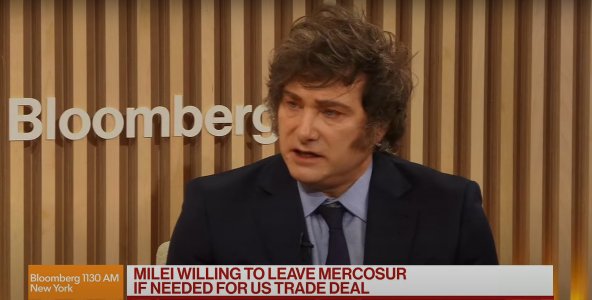Howard Stern
Active member
Interesting article that I read today on Milei and Mersosur.
DECEMBER 18, 2023,
Founded 32 years ago, the Southern Common Market, or Mercosur—a customs union and free trade area consisting of Argentina, Brazil, Uruguay, Paraguay, and now Bolivia—has for some time been stagnant, unable to advance on major policy initiatives.
Then came Argentine presidential candidate Javier Milei. The libertarian, who was inaugurated as Argentina’s president on Dec. 10, declared in August that Mercosur was “defective” and harmful to Argentina. He pledged to withdraw the country and dissolve the bloc.
What a candidate says in the campaign is one thing. “But once you have the responsibility of running the country,” said Juan Cruz Díaz, a managing director of Cefeidas Group, a Buenos Aires-based political risk consultancy, “there are many other factors that you need to consider.” Can Milei make good on his promise to leave Mercosur? And what would happen if he did?
FOR ARGENTINA, LATIN AMERICA’S THIRD-LARGEST ECONOMY, leaving Mercosur would come with destabilizing political and economic costs. Perhaps that was why, a week after Milei’s election victory in November, his soon-to-be foreign minister, Diana Mondino, exhibited a stark change in tone. While visiting Brazil, she reportedly professed to her Brazilian counterparts Argentina’s desire to be a part of a “bigger, improved Mercosur.”
At its founding, Mercosur had a mission to integrate its member states both with one another and with the world. The bloc sought to harness the collective negotiating power of its member states, giving them greater leverage in trade negotiations with external actors. Mercosur also largely eliminated import and export tariffs on trade among its constituent countries. That, combined with its common external tariff designed to create a level internal playing field, has deepened trade among Mercosur’s member states.
As a result of Mercosur, 14 percent of Argentine exports go to Brazil, making it Argentina’s largest export market by a comfortable margin. (China, at 9 percent, is a distant second.) Losing competitive, tariff-free access to Brazil would be devastating for the Argentine economy.
Local industries, such as steel, would struggle to survive on the size of Argentina’s internal market alone. The auto sector, which makes up roughly 10 percent of Argentina’s exports, would be cut off from its principal market, Brazil, in which it faces little competition. Many of the sector’s companies would fold. Unemployment, particularly in Argentina’s more industrialized urban areas, would spike.
Governability is already a concern for the incoming administration. Milei’s allies do not have a majority in either the upper or lower house of Argentina’s Congress. His Liberty Advances coalition controls no provincial governorships. A marked uptick in unemployment would not help matters. Inflation exceeds 160 percent annually, and drastic fiscal and monetary changes—such as the recent decision to devalue the Argentine peso by a record 54 percent and the slashing of transport and utilities subsidies—abound. All this, at a moment when the government’s legislative initiatives will be slow-going. At least for now, it looks as if leaving Mercosur is a political non-starter.
And that’s fortunate for Mercosur. “There’s no Mercosur without Argentina or Brazil,” Cruz Díaz said. Yet persistent frustrations remain—and not just Milei’s or in Argentina. All of Mercosur’s member states are, in one way or another, dissatisfied with one another and with the bloc on the whole.
Uruguay has sparred repeatedly with Brazil and Argentina over flexibilization—that is, allowing countries, particularly the two smaller states, Uruguay and Paraguay, to strike their own trade deals with non-Mercosur members. While proponents argue that loosening the bloc’s restrictions would allow member states to pursue beneficial trade deals, opponents contend that it would weaken Mercosur’s unity (and therefore its leverage in trade negotiations) and could create unfair intra-bloc competition.
Uruguay—a country whose internal market is a fraction of the size of Argentina’s and Brazil’s—is keen to strike out on its own to unilaterally forge trade deals and gain access to foreign markets. Uruguay argues that Mercosur’s rigid, consensus-based decision-making process is overly burdensome for its small economy, which is eager to further integrate with the world. Uruguayan President Luis Lacalle Pou said in March that his country can no longer remain “hostage to Mercosur’s immobility.” Lacalle Pou’s was a stark rebuke of the bloc’s apparent inability to bridge policy disagreements among its members.

What Milei Means for Mercosur
The new Argentine president pledged to dissolve the trading bloc. But what if he ends up saving it?
 foreignpolicy.com
foreignpolicy.com

What Milei Means for Mercosur
The new Argentine president pledged to dissolve the trading bloc. But what if he ends up saving it?
What Milei Means for Mercosur
The new Argentine president pledged to dissolve the trading bloc. But what if he ends up saving it?
By Max Klaver, a journalist based in Buenos Aires. His writing has appeared in the Christian Science Monitor, the Buenos Aires Herald, and Foreign Brief.DECEMBER 18, 2023,
Founded 32 years ago, the Southern Common Market, or Mercosur—a customs union and free trade area consisting of Argentina, Brazil, Uruguay, Paraguay, and now Bolivia—has for some time been stagnant, unable to advance on major policy initiatives.
Then came Argentine presidential candidate Javier Milei. The libertarian, who was inaugurated as Argentina’s president on Dec. 10, declared in August that Mercosur was “defective” and harmful to Argentina. He pledged to withdraw the country and dissolve the bloc.
What a candidate says in the campaign is one thing. “But once you have the responsibility of running the country,” said Juan Cruz Díaz, a managing director of Cefeidas Group, a Buenos Aires-based political risk consultancy, “there are many other factors that you need to consider.” Can Milei make good on his promise to leave Mercosur? And what would happen if he did?
FOR ARGENTINA, LATIN AMERICA’S THIRD-LARGEST ECONOMY, leaving Mercosur would come with destabilizing political and economic costs. Perhaps that was why, a week after Milei’s election victory in November, his soon-to-be foreign minister, Diana Mondino, exhibited a stark change in tone. While visiting Brazil, she reportedly professed to her Brazilian counterparts Argentina’s desire to be a part of a “bigger, improved Mercosur.”
At its founding, Mercosur had a mission to integrate its member states both with one another and with the world. The bloc sought to harness the collective negotiating power of its member states, giving them greater leverage in trade negotiations with external actors. Mercosur also largely eliminated import and export tariffs on trade among its constituent countries. That, combined with its common external tariff designed to create a level internal playing field, has deepened trade among Mercosur’s member states.
As a result of Mercosur, 14 percent of Argentine exports go to Brazil, making it Argentina’s largest export market by a comfortable margin. (China, at 9 percent, is a distant second.) Losing competitive, tariff-free access to Brazil would be devastating for the Argentine economy.
Local industries, such as steel, would struggle to survive on the size of Argentina’s internal market alone. The auto sector, which makes up roughly 10 percent of Argentina’s exports, would be cut off from its principal market, Brazil, in which it faces little competition. Many of the sector’s companies would fold. Unemployment, particularly in Argentina’s more industrialized urban areas, would spike.
Governability is already a concern for the incoming administration. Milei’s allies do not have a majority in either the upper or lower house of Argentina’s Congress. His Liberty Advances coalition controls no provincial governorships. A marked uptick in unemployment would not help matters. Inflation exceeds 160 percent annually, and drastic fiscal and monetary changes—such as the recent decision to devalue the Argentine peso by a record 54 percent and the slashing of transport and utilities subsidies—abound. All this, at a moment when the government’s legislative initiatives will be slow-going. At least for now, it looks as if leaving Mercosur is a political non-starter.
And that’s fortunate for Mercosur. “There’s no Mercosur without Argentina or Brazil,” Cruz Díaz said. Yet persistent frustrations remain—and not just Milei’s or in Argentina. All of Mercosur’s member states are, in one way or another, dissatisfied with one another and with the bloc on the whole.
Uruguay has sparred repeatedly with Brazil and Argentina over flexibilization—that is, allowing countries, particularly the two smaller states, Uruguay and Paraguay, to strike their own trade deals with non-Mercosur members. While proponents argue that loosening the bloc’s restrictions would allow member states to pursue beneficial trade deals, opponents contend that it would weaken Mercosur’s unity (and therefore its leverage in trade negotiations) and could create unfair intra-bloc competition.
Uruguay—a country whose internal market is a fraction of the size of Argentina’s and Brazil’s—is keen to strike out on its own to unilaterally forge trade deals and gain access to foreign markets. Uruguay argues that Mercosur’s rigid, consensus-based decision-making process is overly burdensome for its small economy, which is eager to further integrate with the world. Uruguayan President Luis Lacalle Pou said in March that his country can no longer remain “hostage to Mercosur’s immobility.” Lacalle Pou’s was a stark rebuke of the bloc’s apparent inability to bridge policy disagreements among its members.








